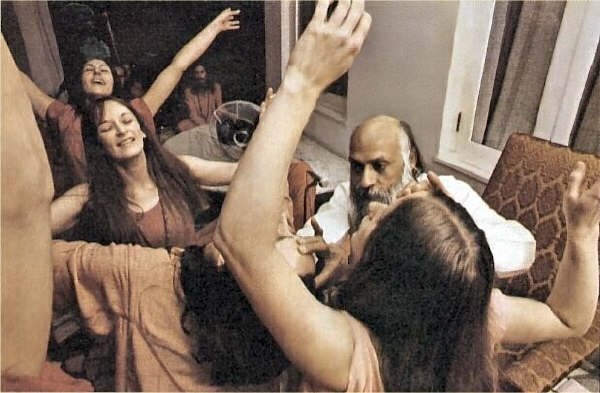There is a beautiful story by Turgenev, THE FOOL.
Once in a town there was a man who was condemned by the whole crowd as the greatest idiot who had ever lived. Obviously he was continuously in difficulty. Whatsoever he would say, people would start laughing, even if he was saying something beautiful, true. But because it was known that he was an idiot, people would think that whatsoever he did and said was idiotic. He might be quoting sages but still people would laugh at him.
He went to a wise old man and told him that he felt like committing suicide, that he could not live anymore. “This constant condemnation is too much — I cannot bear it any longer. Either help me out of it, or I am going to kill myself.”
The old wise man laughed. He said, “There is not much of a problem, don’t be worried. Do only one thing, and come after seven days — start saying no to everything. Start questioning each and everything. If somebody says, ‘Look — look at the sunset, how beautiful it is!’ ask immediately, ‘Where is there any beauty? I don’t see any — prove it! What is beauty? There is no beauty in the world, it is all nonsense!’ Insist on proofs; say, ‘Prove where beauty is. Let me see it, let me touch it! Give me a definition.’ If somebody says, ‘The music is ecstatic,’ immediately jump into it and ask, ‘What is ecstasy? What is music? Define your terms clearly. I don’t believe in any ecstasy. It is all foolishness, all illusion. And music is nothing but noise.’
“Do this with everything, and after seven days come to me. Be negative, ask questions — questions which cannot be answered: What is beauty? What is love? What is ecstasy? What is life? What is death? What is God?”
After seven days the idiot came to the wise man — followed by many many people. He was garlanded and beautifully dressed. The wise man asked, “What happened?”
And the idiot said, “It was magic! Now the whole city thinks that I am the wisest man in the world. Everybody thinks I am a great philosopher, a great thinker. And I have silenced everybody, people have become afraid of me. In my presence they remain silent, because whatsoever they say, I immediately turn it into a question and I become absolutely negative. Your trick worked!”
And the wise man asked, “Who are these people who are following you?”
He said, “These are my disciples — they want to learn from me what wisdom is!”
This is how it is: the mind lives in the no, it is a no-sayer; its nourishment comes from saying no to each and everything. The mind is basically atheistic, negative. There is nothing like a positive mind.
The heart is positive; just as mind says no, the heart says yes. Of course, it is better to say yes than to say no, because one cannot really live by saying no. The more you say no, the more you become shrunken, closed. The more you say no, the less alive you are. People may think you are a great thinker, but you are shrinking and dying; slowly you are committing suicide.
If you say no to love, you are less than you were before; if you say no to beauty, you are less than you were before. And if you go on saying no to each and everything, chunk by chunk you are disappearing. Ultimately a very empty life is left — meaningless, with no significance, with no joy, with no dance, with no celebration.
That’s what has happened to the modern mind, to the modern man. The modern man has said more no’s than ever before. Hence the question: What is the meaning of life? Why are we alive at all? Why go on living? We have said no to God, we have said no to the beyond, we have said no to all for which man has lived down the ages. We have proved to our heart’s content that all the values man has lived for are worthless — but now we are in difficulty, in deep anguish. Life has become more and more impossible for us. We go on living only because we are cowards; otherwise we have destroyed all the reasons to live. We go on living because we cannot commit suicide; we are afraid of death, hence we go on living. We live out of fear, not out of love.
It is better to be positive, because the more positive you are, the more you are moving towards the heart. The heart knows no negative language. The heart never asks, “What is beauty?” It enjoys it, and in enjoying it, it knows what it is. It cannot define it, it cannot explain itself, because the experience is such that it is inexplicable, inexpressible. Language is not adequate enough, no symbols help. The heart knows what love is, but don’t ask. The mind knows only questions and the heart knows only answers. The mind goes on asking but it cannot answer.
Hence philosophy has no answers… questions and questions and questions. Each question becomes, slowly slowly, a thousand and one questions. The heart has no questions — it is one of the mysteries of life — it has all the answers. But the mind will not listen to the heart; there is no communion between the two, no communication, because the heart knows only the language of silence. No other language is known by the heart, no other language is understood by the heart — and the mind knows nothing of silence. The mind is all noise: a tale told by an idiot, full of fury and noise, signifying nothing.
The heart knows what significance is. The heart knows the glory of life, the tremendous joy of sheer existence. The heart is capable of celebrating, but it never asks. Hence the mind thinks the heart is blind. The mind is full of doubts, the heart is full of trust; they are polar opposites.
That’s why it is said that it is better to be positive than to be negative. But remember: the positive is joined with the negative, two sides of the same phenomenon.
I am not here to teach you the ways of the heart. Yes, I use them, but only as a device: to bring you out of your mind I use the heart as a vehicle; to take you to the other shore I use the heart as a boat. Once you have reached the other shore, the boat has to be left behind; you are not expected to carry the boat on your head.
The goal is to go beyond duality. The goal is to go beyond no and yes both, because your yes can have meaning only in the context of no; it cannot be free of the no. If it is free of the no, what meaning will it have? Your yes can exist only with the no, remember; and your no can also exist only with the yes. They are polar opposites, but they help each other in a subtle way. There is a conspiracy: they are holding hands, they are supporting each other, because they cannot exist separately. Yes has meaning only because of the no; no has meaning only because of the yes. And you have to go beyond this conspiracy, you have to go beyond this duality.
OSHO


